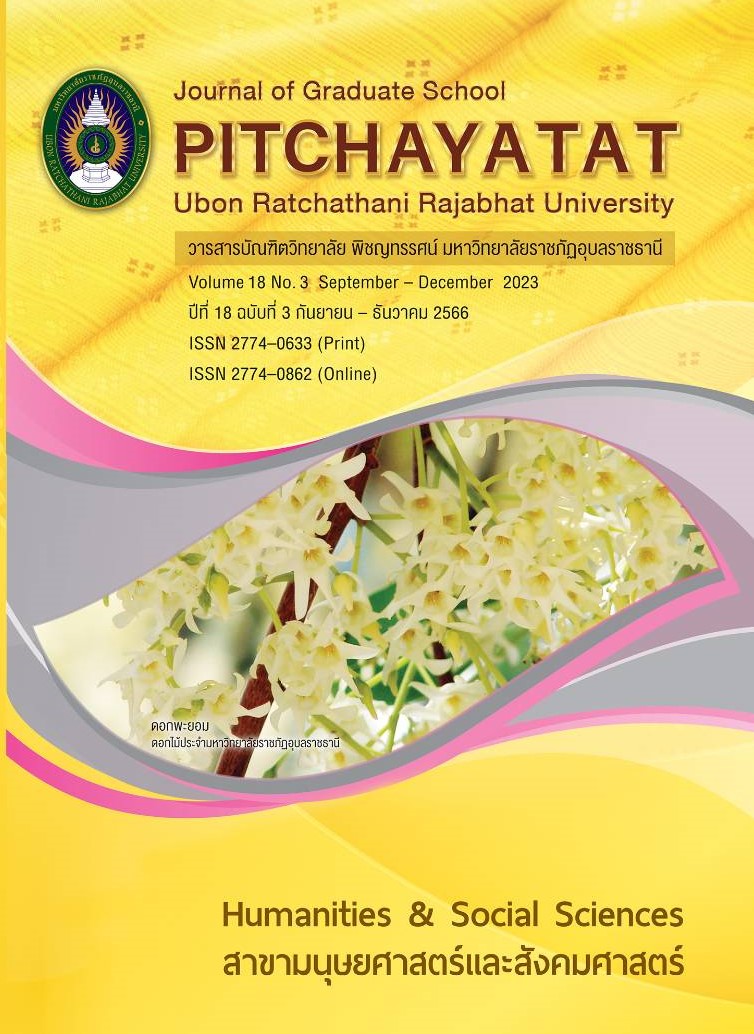Development of English Reading Comprehension Ability by Using Collaborative Learning Activities Based on STAD Technique and 5W1H for the Students in the Department of the Educational Management for Government Personnel
Keywords:
Reading, English Reading Comprehension Skills, Collaborative Learning, STAD and 5W1H TechniquesAbstract
The objectives of the research were 1) to develop collaborative learning activities based on STAD technique and 5W1H that promoted English reading comprehension ability of the students in the department of the educational management for government personnel, 2) to compare English reading comprehension ability of the students in the department of the education management for government personnel before and after learning by using collaborative learning activities based on STAD technique and 5W1H, and 3) to study the levels of the satisfaction of the students in the department of the educational management for government personnel after learning by using the collaborative learning activities based on STAD technique and 5W1H. The samples used in the research were 30 students in the Thai program in the department of the educational management for government personnel, Faculty of Humanities and Social Sciences, in the third semester in the academic year of 2022. They were selected by purposive sampling. The research instruments were 1) leaning management plans by using collaborative learning activities based on STAD technique and 5W1H, 2) a test used to evaluate the students’ ability before and after learning by using collaborative learning activities based on STAD technique and 5W1H, and 3) an evaluation form used to evaluate the students’ satisfaction after learning by using collaborative learning activities based on STAD technique and 5W1H. The statistics used were percentage, mean, standard deviation, t-test, and the index of item objective congruence, IOC.
The research findings were as follows.
- According to the development of the collaborative learning activities based on STAD technique and 5W1H, the students increased the English reading comprehension ability at a high level.
- The English reading comprehension ability of the students in the department of the educational management for government personnel by using collaborative learning activities based on STAD technique and 5W1H after learning was higher than that before learning with the statistical significance at the level of .05.
- The students in the department of the educational management for government personnel were satisfied by learning by using the collaborative learning activities based on STAD technique and 5W1H at the highest level.
References
กมลลักษณ์ บุญขันธ์. การจัดการเรียนการสอนแบบเทคนิคการเรียนรู้แบบเพื่อนคู่คิด (Think pair Share) วิชาการ ประเมินผลการเรียนการสอนภาษาไทย. วิทยานิพนธ์ศึกษาศาสตรมหาบัณฑิต มหาวิทยาลัยรามคำแหง, 2560.
ชนกพร สุริโย. การพัฒนาความสามารถด้านการอ่านคิดวิเคราะห์ของนักเรียนชั้นประถมศึกษาปีที่ 6 โดยใช้เทคนิค 5W1H ประกอบกับแบบฝึก กลุ่มสาระการเรียนรู้ภาษาไทย. วิทยานิพนธ์ครุศาสตรมหาบัณฑิต มหาวิทยาลัยราชภัฏมหาสารคาม, 2562.
ชรินทร์ญา หวังวัชรกุล. “การพัฒนาผลการเรียนรู้โดยใช้กระบวนการกลุ่มแบบร่วมมือเทคนิค STAD เรื่องโครงสร้างข้อมูลแบบลิงก์ลิสต์ สำหรับนักศึกษาระดับปริญญาตรี,” วารสารมหาวิทยาลัยราชภัฏธนบุรี. 17, 1 (มกราคม-มิถุนายน 2566): 71–83.
ทิศนา แขมมณี. ศาสตร์การสอน องค์ความรู้เพื่อการจัดกระบวนการเรียนรู้ที่มีประสิทธิภาพ. พิมพ์ครั้งที่ 8. กรุงเทพฯ: จุฬาลงกรณ์มหาวิทยาลัย, 2560.
บุญชม ศรีสะอาด. การวิจัยเบื้องต้น. พิมพ์ครั้งที่ 10. กรุงเทพฯ: สุวีริยาสาส์น, 2560.
บุตรี เวทพิเชฐโกศล. “การพัฒนาความสามารถในการอ่านภาษาอังกฤษสำหรับนักศึกษาปริญญาตรี โดยใช้วิธีการอ่านแบบร่วมมือ,” วารสารวิชาการธรรมทรรศน์. 22, 2 (เมษายน-มิถุนายน 2565): 83–95.
วีรวิชญ์ บุญส่ง. “การเปรียบเทียบผลสัมฤทธิ์ทางการเรียนรายวิชา สศ 2211402 การจัดการเรียนรู้สังคมศึกษาสำหรับนักศึกษาสาขาวิชาสังคมศึกษาชั้นปีที่ 4 ระหว่างการจัดการเรียนรู้แบบร่วมมือ STAD กับการจัดการเรียนรู้แบบ ปกติ,” วารสารวิชาการสถาบันเทคโนโลยีแห่งสุวรรณภูมิ. 8, 1 (มกราคม–มิถุนายน 2565): 53–65.
อรรชนิดา หวานคง. “การจัดการเรียนการสอนภาษาอังกฤษในศตวรรษที่ 21,” วารสารสถาบันวิจัย ญาณสังวร. 7, 2 (กรกฎาคม–ธันวาคม 2559): 304-314.
อรรชนิดา หวานคง. “การรับรู้และทัศนคติของนักศึกษาสาขาภาษาอังกฤษที่มีต่อการเรียนรู้แบบร่วมมือเทคนิค STAD มหาวิทยาลัยมหามกุฏราชวิทยาลัย,” วารสารศึกษาศาสตร์์ มหาวิทยาลัยมหามกุฏราชวิทยาลััย. 10, 1 (มกราคม–มิถุนายน 2565): 156–172.
อรษา เกมกาเมน. ผลการเรียนรู้วิชาคณิตศาสตร์ เรื่อง โจทย์ปัญหาเศษส่วน ของนักเรียนชั้น ประถมศึกษาปีที่ 6 โดยการจัดการเรียนรู้แบบร่วมมือกันแบบแบ่งกลุ่มผลสัมฤทธิ์ (STAD) ผสาน กลวิธี STAR. วิทยานิพนธ์ศิลปศาสตรมหาบัณฑิต มหาวิทยาลัยเทคโนโลยีราชมงคลธัญบุรี, 2559.
Ahmadi, R. “The Relationship Between Students Reading Motivation and Reading Comprehension,” Journal of education and practice. 4, 18 (2013): 8-17.
Berzener, D. et al. “The Effect of Cooperative Learning on EFL Learners' Success of Reading Comprehension: An Experimental Study Implementing Slavin's STAD Method,” The Turkish Online Journal of Educational Technology. 20, 4 (October 2021): 90–100.
Herman, S. et al. “Teachers’ Attitude towards Minimum Competency Assessment at Sultan Agung Senior High School in Pematangsiantar, Indonesia,” Journal of Curriculum and Teaching. 11, 1 (2022): 1–14.
Johnson, R.T. and D.W. Johnson. Creativity and Collaborative Learning. Baltimore: Paul H. Brookes Publishing. 1994.
O'Malley, J.M. and A.U. C. Learning strategies in second language acquisition. Cambridge, UK: Cambridge University Press, 1990.
Sabat, S. et al. “The Effectiveness of Coopertative Learning (STAD and PBL type) on E-learning Sustainable Development in Higher Education,” Journal of Development Research. 4, 1 (May 2020): 53–61.
Shelly, R. Responding to Social Chang. Pensylvania: Dowder, 2009.
Yuanmalai, K. Reading for life. O.S.: Print Thinghouse in Thai, 1996.
Downloads
Published
How to Cite
Issue
Section
License
Copyright (c) 2023 Journal of Graduate School, Pitchayatat, Ubon Ratchathani Rajabhat University

This work is licensed under a Creative Commons Attribution-NonCommercial-NoDerivatives 4.0 International License.
Every article is peer-reviewed for academic correctness by at least three external qualified experts. The opinions in the Pitchayatat Journal (Humanities and Social Sciences) belong to the authors; not belong to the Publisher. Thus, Pitchayatat Journal cannot to be held responsible for them. The articles in this journal are protected by the copyright of Thailand. No part of each issue may be reproduced for dissemination without written permission from the publisher.





